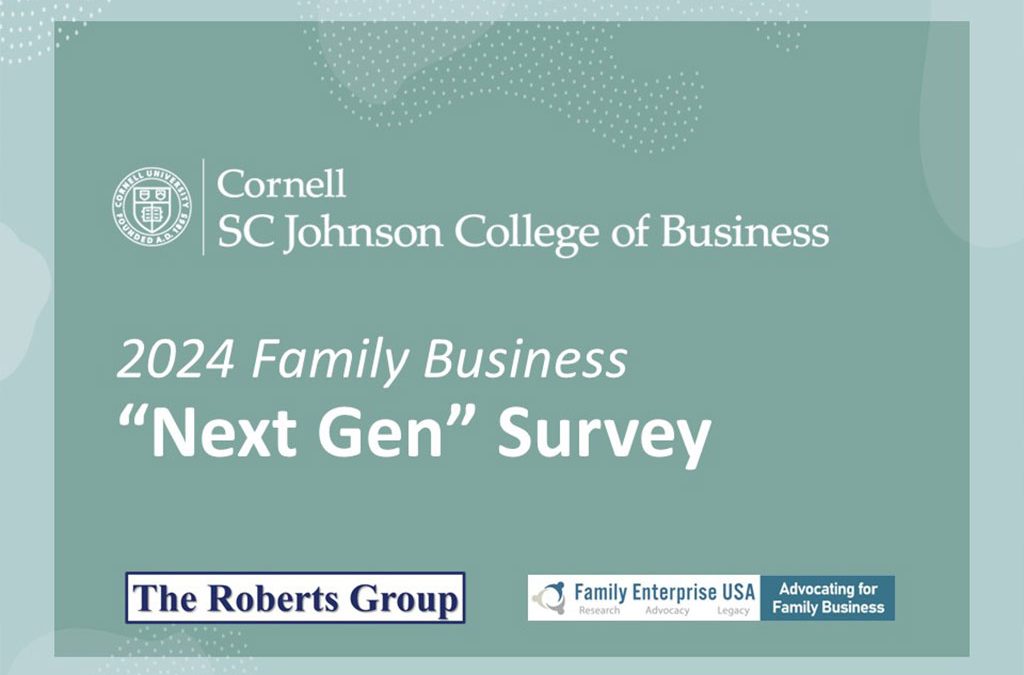The data is in! See what family owned businesses are saying about today’s challenges and opportunities.
87% of Americans go to work every day for a family business, and around the world, family businesses play an enormous role in local and global economies.
The Smith Family Business Initiative at Cornell University, in cooperation with Family Enterprise USA and The Roberts Group, designed a survey to give voice to next-generation family business owners (including those who may not currently be part of a family business but who may be interested in starting, joining, or working with one in some capacity in the future), so that we can better understand their concerns and attitudes towards family businesses, in order to better support their needs.
Our survey respondents were enrolled in a family business or entrepreneurship-related course during the 2023-2024 academic year. Although only schools in North America were targeted, respondents came from a variety of countries and cultures. Overall, we received 92 partial and full responses. Among these, 51 indicated they come from a family that owns or operates a family business, and 41 indicated they do not, and of those nearly 70% indicate they will either rejoin or remain employed in their families business after completion of their studies.
When asked for the first term that came to mind when hearing the term “family business,” the most frequent response (supplied by 17 people) was “legacy,” followed by other words including “family,” “succession,” and “business.” Other words that were repeated included “small,” “plan,” “loyalty,” and “communication.”
For those who come from family businesses, their families’ businesses cover a variety of industries and are headquartered mostly in the US (30 out of 49 who answered), with the rest coming from a range of other countries, including Canada, China, Colombia, Ecuador, India, Pakistan, Philippines, Taiwan, Thailand, and Uzbekistan. Over half (of 50 responses) indicated their family businesses were founded between 1951-2000. 31 (of 50 responses), or 62%, indicated they are currently involved and/or employed in the family business. 36% of these same respondents indicated they would rejoin the family business at some point in the future. Only 1 respondent indicated he/she/they would never rejoin the family business. The majority of respondents (62%) are second-generation in the family business. The age range of respondents is from 18 to 40, with an average of 23.9.
The biggest concern identified was family communication, followed by growing revenue and succession planning, having the business remain competitive, and whether they are qualified themselves to join/take over the business.
Finally, students were challenged with the question “If you had the courage to ask your parents any question, what would it be?” the responses revealed how difficult family conversations tend to be, especially as it pertains to the family business, money and wealth, and difficult decisions. many of them wanted to ask about the plan for succession. A few of the most poignant responses included:
- Will you ever retire?
- Do you feel like I deserve the company?“Is the family business worth the conflict that it brings?”
- What would you have done differently?
- What is the most difficult part about working with family?
- What was your biggest mistake?
- What would it take to trust me?
- What are your expectations about us as the next generation managing the business?
- What do you hope its legacy will be for future generations?
This survey was conducted by the Smith Family Business Initiative at Cornell University, with the support of Family Enterprise USA and the Roberts Group at Merrill Lynch.
We hope you've enjoyed this article. While you're here, we have a small favor to ask...
As we prepare for what promises to be a pivotal year for America, we're asking you to consider becoming a member.
The need for fact-based reporting of issues important to family owned businesses and protecting a lifetime of savings has never been greater. Now more than ever, successful families and family owned businesses are under fire. That's why Family Enterprise USA is passionately working to increase the awareness of issues important to family owned businesses built on hard work, while continuing to strengthen our presence on Capitol Hill. The issues we fight for or against with Congress in Washington DC include high income tax rates, possible elimination of valuation discounts, increase in capital gains tax, enactment of a wealth tax, and the continued burden of the gift tax, estate tax and generation skipping tax.
Family Enterprise USA promotes generationally owned family business creation, growth, viability, and sustainability by advocating for family businesses and their lifetime of savings with Congress in Washington DC. Since 2007, Family Enterprise USA has represented and celebrated all sizes, professions and industries of family-owned enterprises and multi-generational employers. It is a bi-partisan 501.c3 organization. Family foundations can donate.
#incometax #CapitalGainsTax #R&DExpensing #DontPunishSuccess #GrantorTrusts #StepUpinBasis #likeKindExchanges #AcceleratedDepreciation #EstateTax #Deathtax #wealthtax #taxLegislation #CongressionalCaucus #incometaxrates #repealestatetax #AdvocatingForFamilyBusinesses #FamilyOwnedBusiness #WomenOwnedBusiness @FamilyEnterpriseUSA #FamilyEnterpriseUSA


